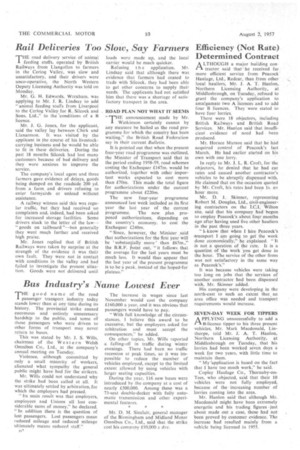Bus Industry's Name Lowest Ever
Page 42

If you've noticed an error in this article please click here to report it so we can fix it.
THEgood name of the road passenger transport industry today stands lower than at any time during its history. The provincial strike caused enormous and entirely unnecessary hardship to the public; and some of those passengers who were driven to other forms of transport may never return to buses.
This was stated by Mr. J. S. Wills, chairman of the West e en Welsh Omnibus Co., Ltd., at the company's annual meeting on Tuesday.
Violence, although committed by only a small minority of workers, alienated what sympathy the general public might have had for the strikers.
Mr. Wills could not understand why the strike had been called at all. It was ultimately settled by arbitration, for which the employers had pressed. " Its main result was that employers, employees and Unions all lost considerable sums of money," he declared. "In addition there is the question of lost passengers. Lost passengers mean reduced mileage and reduced mileage ultimately means reduced staff." The increase in wages since last November would cost the company £160,000 a year, and it was obvious that passengers would have to pay.
" With full knowledge of the circumstances, I believe this award to be excessive, but the employers asked for arbitration and must accept the consequences,he added.
On other topics, Mr. Wills reported a falling-off in traffic during winter evenings. There had been no traffic recession at peak times, so it was impossible to reduce the number of vehicles employed, except to the limited extent allowed by using vehicles with larger seating capacities.
During the year, 116 new buses were introduced by the company at a cost of nearly £500.000. Among these was a 73-seat double-decker with fully automatic transmission and other experimental features.
Mr. D. M. Sinclair. general manager of the Birmingham and Midland Motor Omnibus Co., Ltd., said that the strike cost his company £10,000 a day.








































































































